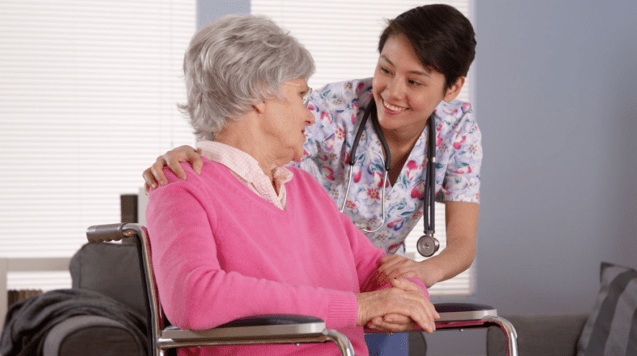
Dementia is common in senior care facilities.
The Alzheimer’s Association estimates almost 50% of residents in assisted living facilities and nursing homes have some form of dementia or cognitive impairment. Providing care for residents and patients with dementia can be an overwhelming challenge. In moments of confusion, dementia sufferers may become uncooperative, wander off unsupervised, or even lash out at their caregivers. As a healthcare worker, you’re eager to take on these challenges – but it’s important to know how.
We’ve spoken with dementia care expert, Courtney Martin, and compiled four key tips for providing dementia care. Take these tips to heart to optimize your dementia care-giving skills! Remember: The care you provide in these moments will influence your residents’ and patients’ safety, comfort, and dignity.
1. Develop a Routine
Routines are the cornerstone of dementia care. As dementia progresses, residents and patients will find it increasingly difficult to complete both new and familiar tasks. Implementing a simple yet engaging routine grounds people with dementia, giving them a norm to cling to. This routine can include scheduled times for walks, meals, baths, medications, and more. As time passes, dementia sufferers may even forget how to do things they once loved, causing them to lose interest entirely. So when tailoring a routine, include fun times too!

2. Communicate Clearly and Calmly
Working in assisted living and nursing home environments requires exceptional time management skills. Poor communication with individuals with dementia can take time away from others who need your attention. Optimizing your encounters with dementia sufferers is a sure way to provide appropriate care and save time doing it! When communicating with individuals with dementia, remember to:
Remove distractions – Television, radio, and surrounding noise can prevent individuals with dementia from focusing on your care.
Engage them positively – Individuals with dementia can discern your mood based on your body language and tone.
Explain what’s going on – As dementia worsens, patients and residents can become confused more quickly. It can be alarming when caretakers enter their room and start making changes or providing hands-on care without preparing them first. Take the time to explain what you’re doing.
Involve them – Whether it’s taking medication or taking a bath, allow your residents and patients to contribute to their care to the best of their abilities.
Efficient communication promotes skilled care. Keeping dementia sufferers engaged and focused will conserve time without sacrificing proper care.

3. Maintain a Safe Environment
The annual rate of injury in nursing facilities is high. Of the 1.6 million patients in U.S. nursing homes, approximately half experience a fall each year – and the likelihood is higher for dementia sufferers. These falls and other injuries can be prevented by employing a few safety checks, such as:
– Removing tripping hazards
– Inspecting grab bars for the shower and toilet
– Locking away medications
– Inspecting fire alarms and carbon monoxide detectors
– Installing guard rails on the patients’ and residents’ and patients’ bed
No clinician wants to see their patients and residents and patients sustain an injury – much less be responsible for it. Implementing these and other safety measures will reduce the potential for injury.

4. Share a Moment
Some people with dementia can enjoy conversations. Those in more advanced stages may find that difficult. No matter the situation, there are ways to share a nice moment. Maybe share a treat or cherished pictures. Consider telling a story or giving a hug. There are many opportunities to share the warmth of human interaction without the overwhelming pressure to converse.

About Courtney Martin
Courtney Martin is a Certified Dementia Practitioner. She is renowned for her work as a Certified Dementia Care Manager and a Certified Alzheimer’s Disease & Dementia Care Trainer. Martin has been featured in magazines, such as Today’s Transitions and the National Council of Certified Dementia Practitioners. From 2019-2020, Martin served alongside Dr. Benjamin Mast at the University of Louisville as part of a research team that studied better ways to care for people with dementia.
Become a Certified Dementia Practitioner
Are you ready to advance your dementia care skills? Become a Certified Dementia Practitioner! This valuable certification will render you instantly marketable to highly-rated facilities all over the country, such as
– Assisted Living Facilities
– Nursing Homes
– Hospitals
– Clinics
– Rehab Facilities and more!
Chart the future of your career today! Visit the National Council of Certified Dementia Practitioners website and begin your journey to ensuring no person goes without care.



